Nails in the cover of the coffin of Runet
All of course in the course of the latest discussions in the State Duma regarding autonomous Runet. Many have heard about this, but what it is and what it has to do with it - they did not think. In this article I tried to explain why this is necessary and how it will affect Russian users of the global network.
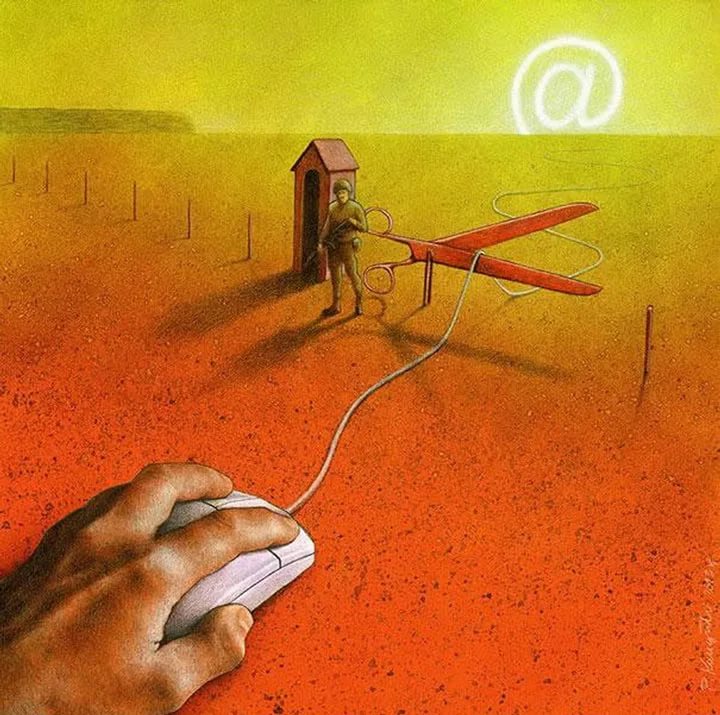
In general terms, the action strategy in the bill is described as follows:
I want to draw your special attention to “state control over the international communication channel and traffic exchange points” - this is the very “drawbridge” between servers / information exchange channels within the country and similar Internet tools / users around the world. Or simply put - a switch. What this really means is read on.
Of course, most politicians are FOR, you need to protect yourself from enemies, they can cut off access to cats and dogs in classmates all around and at any time. But this is a far-fetched argument, since the World Wide Web is so branched that the Americans, even if they wanted to, could not disrupt the work of the entire Runet, since it is GLOBAL.
1. Through ICANN , it is an international nonprofit organization registered in the USA and it distributes domain names. Russian politicians say that the organization is controlled by the American authorities and can, on their orders, take away the top-level domains ru and rf. But in history, this has never happened before, even with more malicious and smaller players (countries) that are not pleasing to Washington. Moreover, in 2015, the US Department of Commerce, with which ICANN was to consult on strategic decisions, lost these functions.
2. Through the RIPE NCC Regional Internet IP Registrar- This is an independent Dutch association, which has repeatedly emphasized that it is not involved in politics, but simply keeps track of addresses. Moreover, if they decide to take blocks of IP addresses from Russia, this will disrupt the Internet in other countries.
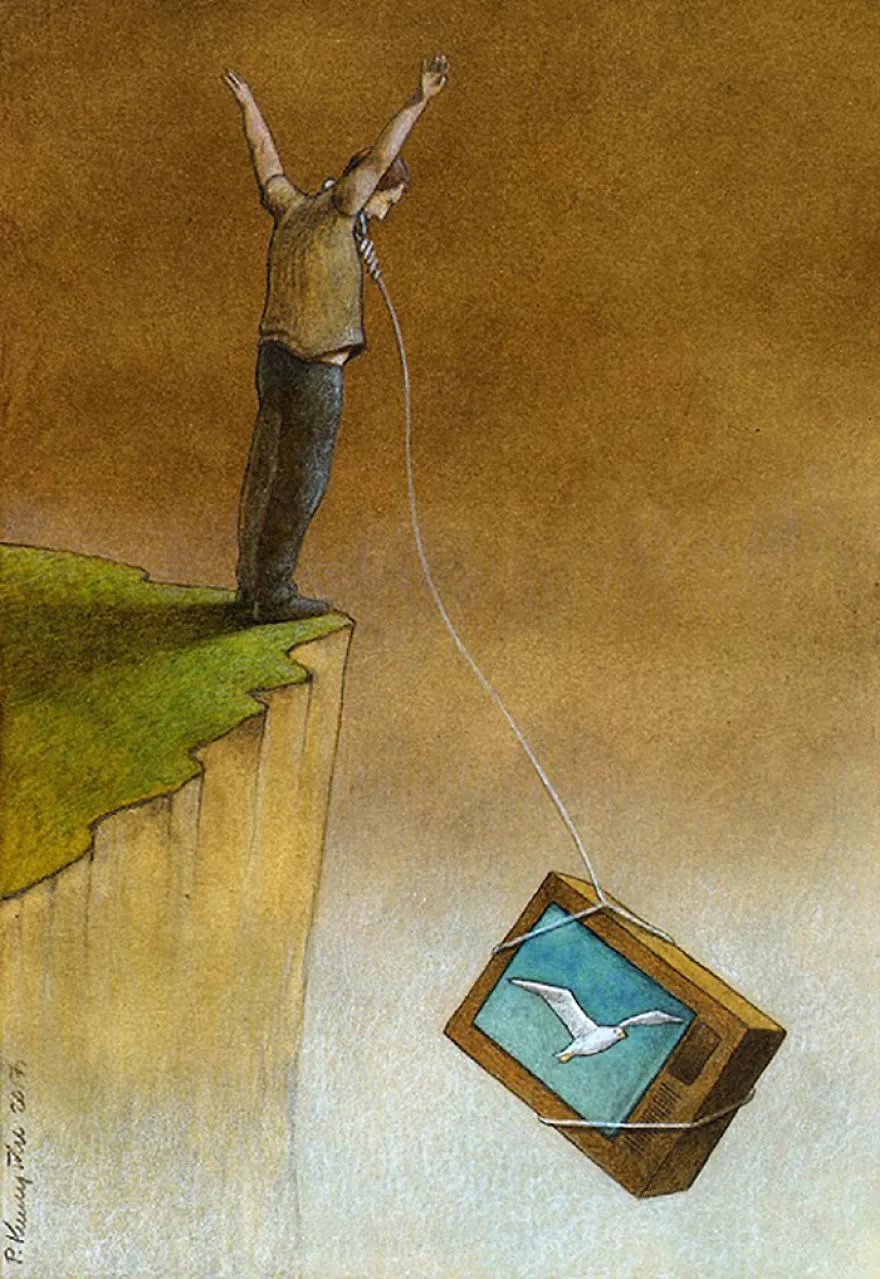
To understand why, how and why , in my opinion, you need to start with a short history of the formation of Runet.
The history of the Russian Internet can be safely started from 1990, when in January, the Glasnet public organization was created with the funding of the American Association for Progressive Communications from San Francisco. This public organization was called upon to provide teachers, human rights defenders, environmentalists and other guarantors of an open society with communication.
1991 - 1995 , the first connections to the world wide web appear, usually within the framework of research institutes, the first providers appear in parallel and connect a few users. Registration of the RU domain at the Kurchatov Institute, creating a supporting infrastructure for the integration of university networks RUNNet (Russian Universities Network). The appearance of the first server.
1996- The Open Society Institute (Soros Foundation) has begun implementing the University Internet Centers program, designed for five years - until 2001. The program is implemented jointly with the Government of the Russian Federation. The purchase of equipment and financial support for the University centers of the Internet in the amount of $ 100 million is carried out by the Soros Foundation. This served as a further technical impetus for the development of the Internet web in Russia.
The number of users 384 thousand.
1997 - the emergence of the search engine Yandex.ru for search in the Russian-language segment.
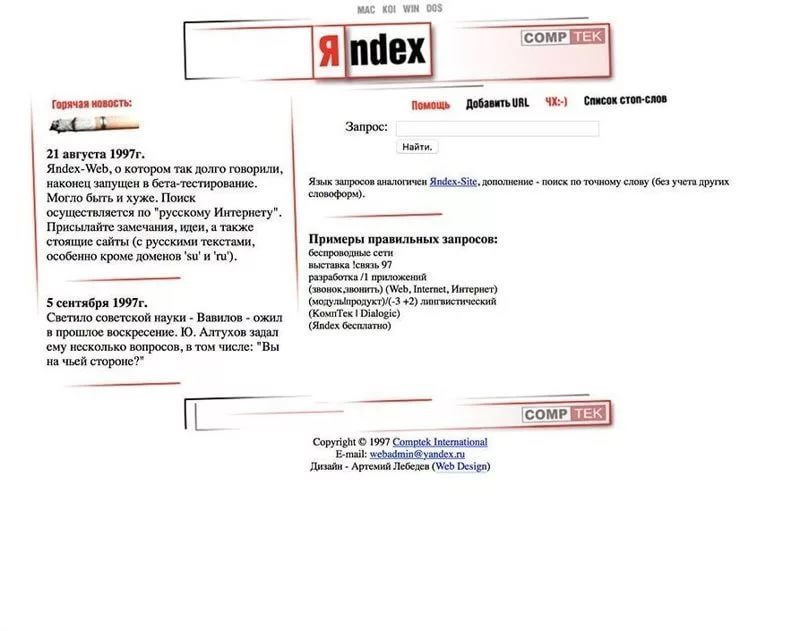
The number of users reached 1.2 million.
1998 - 2000 The number of users reaches 2 million. The first major online news publications appear, more than 300 Internet providers operate in the country, the network architecture is growing at a tremendous pace, the first advertising networks, the first violations of intelligence loyal property etc.
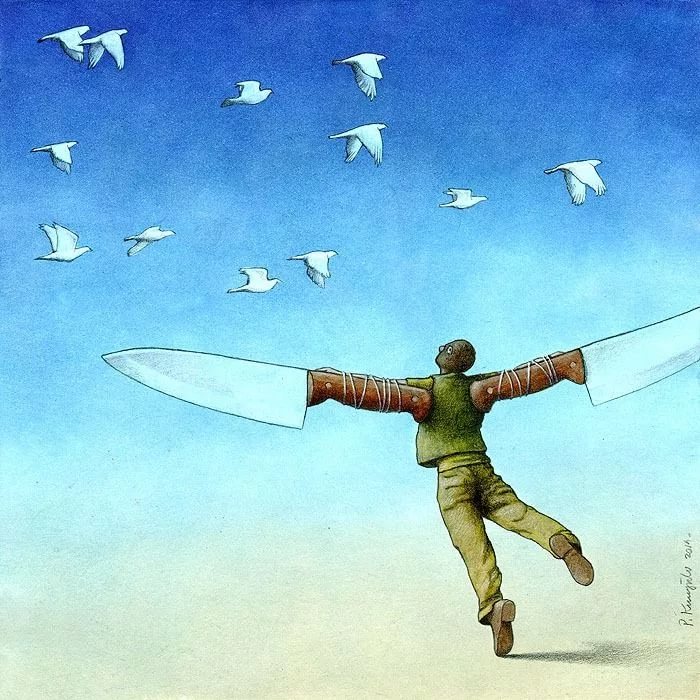
The threat of state control over the Runet arose already in 1999, then the Minister of Communications Leonid Reiman and the Minister of Press Mikhail Lesin proposed taking away the authority to manage the RU domain zone from the public organization established at the Kurchatov Institute (RosNIIRos), which invested efforts and funds in creating the first networks. After a ministerial meeting led by the Prime Minister (Putin) and Internet activists (with the latter struggling), control over the domain zone RU was nevertheless taken from an uncontrolled public organization.
The head of the Foundation for Effective Politics (FEP) Gleb Pavlovsky initiated a meeting of Internet leaders with Prime Minister Vladimir Putin at that time. Pavlovsky is a political strategist who at that moment was close to the Presidential Administration. His FEP then created a number of popular Internet projects - Gazeta.ru, Vesti.ru, Lenta.ru, etc.
At the meeting, Putin told Internet activists about the proposals of Reiman and Lesin. The soldiers (the head of Relkom, author’s note), whom Rykov (the government’s adviser on information technologies, author’s note) had already informed of these proposals, began to categorically object . Against spoke and Anton Nosik(“The father of Runet,” as the media called him, a journalist, was at the origins of the formation of Runet, at that time he was a member of the FEP Council and oversaw such projects as Vesti.ru, Lenta.ru, author's note). Of the representatives of the Internet industry, only the designer Artemy Lebedev advocated the reform of RosNIIIRos, accusing the organization of maintaining high domain prices.

In 2000, Putin signed the doctrine of information security, which contained threats such as "the intention of a number of countries to dominate and violate Russia's interests in the information environment." Within the framework of this doctrine, work began on the preparation and development of a set of measures: the search and creation of personnel, the expansion and opening of special departments as part of relevant departments and ministries, etc.
Since the late 2000s, Russian authorities have stepped up efforts to deprive the American corporation ICANN, which is under formal control of the US authorities, of the authority to globally distribute domain zones and IP addresses. However, representatives of the United States met this idea extremely cool.
Then the Russians changed their tactics and tried to seize power from ICANN through the International Telecommunication Union (ITU), which regulates traditional telecommunications and is headed by Maltese Hamadun Tur, a graduate of the Leningrad Institute of Communications. In 2011, Prime Minister Vladimir Putin at that time met in Geneva with Tours and told him about the need to transfer authority to distribute Internet resources from ICANN to ITU. Russia prepared a draft ITU resolution and began to gather support in the person of China and the countries of Central Asia.
On December 8, 2012, the head of the American delegation, Terry Kramer, called these proposals an attempt to introduce censorship on the Internet. Realizing that the proposal would not work, on December 10, Tours persuaded the Russian side to withdraw it.
Actually, this is where Russia's attempts to create a starting point and get a bit of influence for regulating the Internet on the world stage have failed. And the Russian authorities have completely switched to the domestic segment.

In the fall of 2008, Yandex began to feel one after another trouble: its new data center could not be launched due to bureaucratic problems, a criminal case was opened, in which the head of the company Arkady Volozh appeared , and businessman Alisher showed interest in buying the company Usmanov . Yandex feared an unfriendly takeover.
The reasons for the dissatisfaction of the authorities with Arkady Volozh were explained in the form of screenshots shown from the front page of the Yandex.News aggregator made during the Russian-Georgian war. To clarify the situation, two ministers ( Vladislav Surkov and Konstantin Kostin) visited the Yandex office, where they tried to explain to officials that it’s not people who are collecting news in this service, but a robot operating according to a special algorithm .
According to the memoirs of Gershenzon, the head of YandexNews, Surkov interrupted his speech and pointed to the liberal headline on Yandex.News. “These are our enemies, we do not need this,” the deputy head of the Presidential Administration said. Konstantin Kostin demanded that officials be given access to the service interface.
Yandex was shocked by the results of negotiations with the authorities. But in the end, the struggle with officials ended with the provision of partnership status marked “representative of an interested newsmaker” and Alexander Voloshin joined the Yandex board of directors., former head of the Presidential Executive Office Boris Yeltsin and Vladimir Putin.
Approximately the same scenario, but to varying degrees of sophistication can be seen in cases of partial extraction of Kaspersky Lab ( here an interesting article on this subject ) and Vkontakte ( read here ). And these are only resonant cases known to the author.
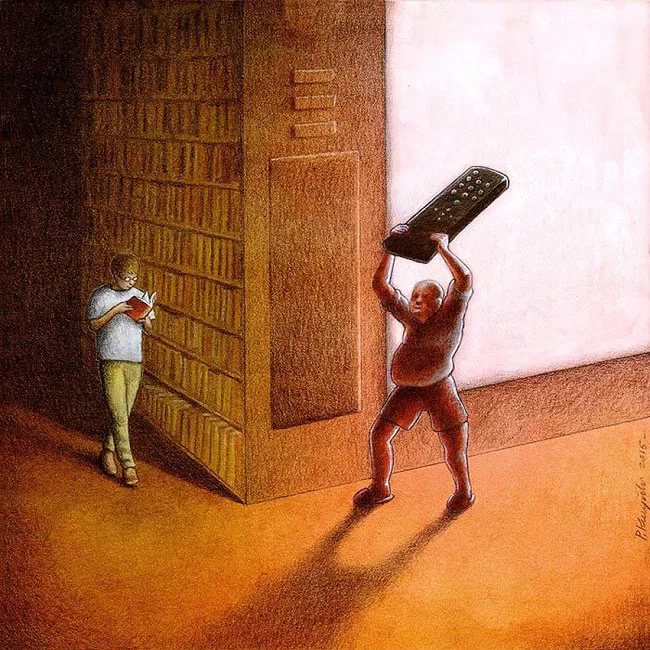
Further, the machine of prohibitions and regulation of runet was already gaining momentum and acquired modern features. Special laws were prepared with vague content so that they were not directly considered censorship, under the auspices of security or the fight against extremism. Blocking of illegal content, by expanding the powers of Roskomnadzor, has already begun to be massive. Those in power with major players in this segment held negotiations. Well, and as the culmination of this stage - real administrative cases have already begun with fines and criminal prosecutions of ordinary users, which in the public mind are fixed as “For likes and reposts”.
Therefore, in order to completely control the network, the only thing left for those in power is to adopt the experience of China (they thought about it even earlier) and begin work on centralizing runet. For many experts, this seems to be a difficult and expensive “pleasure”, since China built its network immediately with the arrival of the Internet in the region, and in Russia, as described above, it was built by itself. But the main thing is to start, because there is already an agreement with the Chinese and experience, so to speak, flows in a stream from China.
There is an opinion of some officials that this bill is aimed only at protecting Russian business (near-state naturally) and public services from the machinations of Americans. Allegedly, you need to protect them from disconnection and save their data. But the fact that they are all already functioningquite a long time on internal servers (all government sites, near-state business, high-tech enterprises within the military-industrial complex, etc.) officials for some reason did not say. Moreover, the recent MIR payment system was introduced in connection with the Americans' ability to block existing popular payment systems. Believe me, they are protected as much as possible and specialized “hardware” with protection against cyber threats has long been standing.
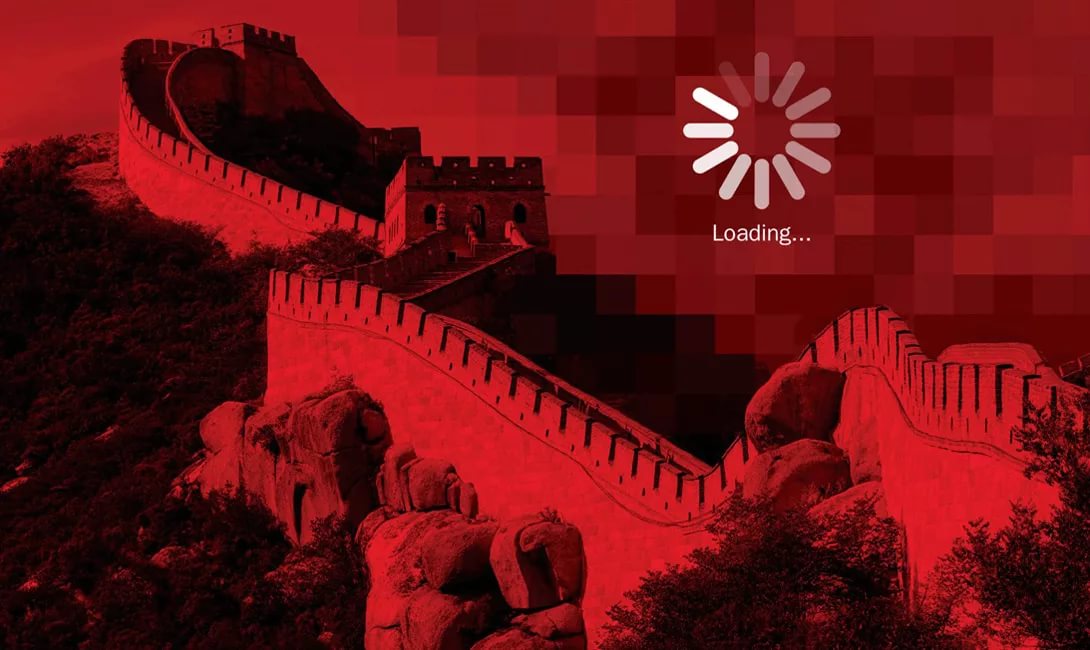
The bill on sovereign Internet will allow to begin work on creating an internal network infrastructure, where all traffic to foreign servers passes first through the “gateways” controlled by the state
And while the "debate" is ongoing, the Ministry of Communications has already prepared a resolution to limit the routing of Russian traffic outside the Internet, in order to protect us, citizens, from the "wiretap" of unfriendly countries. The new law will untie their hands and provide funds for this. The resolution also states: “... by 2020, the share of internal traffic of the Russian segment of the Internet, which goes through foreign servers, should decrease by up to 5% ...”, does this not remind you of the Iron Curtain, but so far only in virtual space?
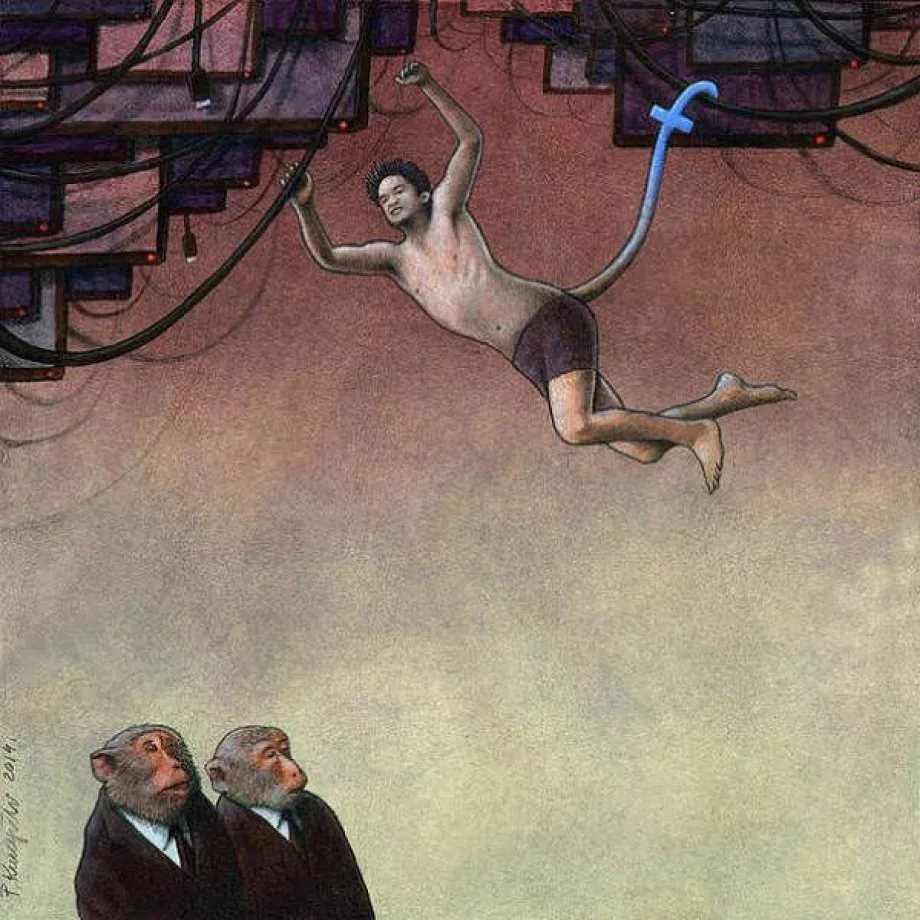
All these measures will affect all working Russians and Russian network users who have not been subjected to patriotic frenzy.
Quite literally and without metaphors, the state will take money from your pocket to restrict you from receiving information.
The chain reaction from such actions without exaggeration is large-scale.
We use services and gadgets, which are almost all the development of foreign companies, not all of these companies will want to duplicate information on Russian servers, while paying for their storage, thereby affecting the withdrawal of these services from the market (for which the loss of Russian users is not significant), Of course, not everyone will leave, thereby reducing competition, which will ultimately affect pricing. Not to mention the fact that they will constantly fail due to loss of connection with their servers abroad.
It is not known whether they will be ready.
Facebook / Instagram / Reddit / Twitter / YouTube / Vimeo / Vine / WhatsApp / Viber and other popular services of such Internet giants as Amazon / Google / Microsoft and others. Transfer information to servers in the Russian zone, this amount of data and work to transfer them , in my opinion, it is not comparable with the income from our market now, and even more so in the long term.
Many toys will stop working or fall off every 10 minutes of online games, free torrent trackers will be inaccessible even through a proxy server. You will not watch your favorite films “without registration and SMS” anymore, you will be horrified to find that search engines no longer find Marvel and DC, because access to these resources abroad will be blocked.
And another, in my opinion, a terribly important factor that ordinary users may not consider is the communication problems that scientists and researchers will encounter . Since this is the most dependent on the openness of receiving information, the community. After all, it will not be a secret for anyone that the largest scientists and research databases are located abroad.
By isolating the Internet from the rest of the world and redistributing the network architecture inside Runet, the authorities will be able to proceed to the next phase (or in parallel) - this is the creation (according to the priceless experience of the Celestial Empire) of software and hardware for automatic control and blocking of illegal content. And this is an analogue of the great Chinese firewall (below is a link for review)
Of course, the above described takes time and a huge amount of tools, technologies and knowledge . There will be sufficient problems with the latter, and this remains to be hoped. Plus, this is a rather sad prognosis. As for money, it doesn’t matter, there are many options - they will introduce an additional tax on Internet providers and do not be surprised when you discover an increase in your tariff by 100-200 rubles.
The conclusions in the article are solely the opinion of its author. If you doubt the evidence given, then you still have Google - google the events described in the article, read and dive further into this rabbit hole.
About the Autonomous Runet Bill
The Ministry of Telecommunications Initiative to reduce traffic abroad The
Great Chinese Firewall
Results of state regulation of the Runet in 2018
Laws on the restriction of Runet

In general terms, the action strategy in the bill is described as follows:
“... a bill on state control over the passage of Internet traffic in Russia. In particular, it provides for the creation of a registry of Runet IP addresses and "monitoring the use of global addressing resources and global Internet identifiers (DNS and IP addresses)", as well as the establishment of state control over international communication channels and traffic exchange points ... "Vedomosti
I want to draw your special attention to “state control over the international communication channel and traffic exchange points” - this is the very “drawbridge” between servers / information exchange channels within the country and similar Internet tools / users around the world. Or simply put - a switch. What this really means is read on.
Of course, most politicians are FOR, you need to protect yourself from enemies, they can cut off access to cats and dogs in classmates all around and at any time. But this is a far-fetched argument, since the World Wide Web is so branched that the Americans, even if they wanted to, could not disrupt the work of the entire Runet, since it is GLOBAL.
The only arguments (in my opinion) in the "shutdown" of Runet can serve 2 hypotheses
1. Through ICANN , it is an international nonprofit organization registered in the USA and it distributes domain names. Russian politicians say that the organization is controlled by the American authorities and can, on their orders, take away the top-level domains ru and rf. But in history, this has never happened before, even with more malicious and smaller players (countries) that are not pleasing to Washington. Moreover, in 2015, the US Department of Commerce, with which ICANN was to consult on strategic decisions, lost these functions.
2. Through the RIPE NCC Regional Internet IP Registrar- This is an independent Dutch association, which has repeatedly emphasized that it is not involved in politics, but simply keeps track of addresses. Moreover, if they decide to take blocks of IP addresses from Russia, this will disrupt the Internet in other countries.

To understand why, how and why , in my opinion, you need to start with a short history of the formation of Runet.
A brief history of Runet
The history of the Russian Internet can be safely started from 1990, when in January, the Glasnet public organization was created with the funding of the American Association for Progressive Communications from San Francisco. This public organization was called upon to provide teachers, human rights defenders, environmentalists and other guarantors of an open society with communication.
1991 - 1995 , the first connections to the world wide web appear, usually within the framework of research institutes, the first providers appear in parallel and connect a few users. Registration of the RU domain at the Kurchatov Institute, creating a supporting infrastructure for the integration of university networks RUNNet (Russian Universities Network). The appearance of the first server.
1996- The Open Society Institute (Soros Foundation) has begun implementing the University Internet Centers program, designed for five years - until 2001. The program is implemented jointly with the Government of the Russian Federation. The purchase of equipment and financial support for the University centers of the Internet in the amount of $ 100 million is carried out by the Soros Foundation. This served as a further technical impetus for the development of the Internet web in Russia.
The number of users 384 thousand.
1997 - the emergence of the search engine Yandex.ru for search in the Russian-language segment.

June 28 can be considered the first action known in history to justify the Internet - as free space . Then, a section devoted to SORM-2 (a system of operational-search measures) was opened on the Moscow Libertarium’s website , which makes it possible to effectively bypass FSB requirements of the Constitution and current legislation regarding binding judgments to limit confidentiality of correspondence to computer networks.The publication of news, studies, comments, as well as various actions directed against SORM-2, led to the fact that information about the SORM-2 project, which allows for monitoring of citizens, became public knowledge.
The number of users reached 1.2 million.
1998 - 2000 The number of users reaches 2 million. The first major online news publications appear, more than 300 Internet providers operate in the country, the network architecture is growing at a tremendous pace, the first advertising networks, the first violations of intelligence loyal property etc.
In general, the 90s can be considered the basis for the formation and development of the Internet in Russia, which was created in the conditions of freedom and lack of control by the state and generally with funds from commercial and charitable organizations. This is reflected in its internal decentralized topology of networks and servers that are not tied to specific territories and do not fall under the jurisdiction of a particular country. Subsequently, all this allowed the Russian segment to grow to a very impressive size.

History of State Control Attempts
The threat of state control over the Runet arose already in 1999, then the Minister of Communications Leonid Reiman and the Minister of Press Mikhail Lesin proposed taking away the authority to manage the RU domain zone from the public organization established at the Kurchatov Institute (RosNIIRos), which invested efforts and funds in creating the first networks. After a ministerial meeting led by the Prime Minister (Putin) and Internet activists (with the latter struggling), control over the domain zone RU was nevertheless taken from an uncontrolled public organization.
From the Red Web book - about the history of control of domestic special services over telecoms:
The head of the Foundation for Effective Politics (FEP) Gleb Pavlovsky initiated a meeting of Internet leaders with Prime Minister Vladimir Putin at that time. Pavlovsky is a political strategist who at that moment was close to the Presidential Administration. His FEP then created a number of popular Internet projects - Gazeta.ru, Vesti.ru, Lenta.ru, etc.
At the meeting, Putin told Internet activists about the proposals of Reiman and Lesin. The soldiers (the head of Relkom, author’s note), whom Rykov (the government’s adviser on information technologies, author’s note) had already informed of these proposals, began to categorically object . Against spoke and Anton Nosik(“The father of Runet,” as the media called him, a journalist, was at the origins of the formation of Runet, at that time he was a member of the FEP Council and oversaw such projects as Vesti.ru, Lenta.ru, author's note). Of the representatives of the Internet industry, only the designer Artemy Lebedev advocated the reform of RosNIIIRos, accusing the organization of maintaining high domain prices.
“If a law governing activities on the Internet is adopted in Russia, this will mean a redistribution of property on the Internet market in the interests of those people who order this law.” Бори Anton Borisovich Nosik

In 2000, Putin signed the doctrine of information security, which contained threats such as "the intention of a number of countries to dominate and violate Russia's interests in the information environment." Within the framework of this doctrine, work began on the preparation and development of a set of measures: the search and creation of personnel, the expansion and opening of special departments as part of relevant departments and ministries, etc.
Since the late 2000s, Russian authorities have stepped up efforts to deprive the American corporation ICANN, which is under formal control of the US authorities, of the authority to globally distribute domain zones and IP addresses. However, representatives of the United States met this idea extremely cool.
Then the Russians changed their tactics and tried to seize power from ICANN through the International Telecommunication Union (ITU), which regulates traditional telecommunications and is headed by Maltese Hamadun Tur, a graduate of the Leningrad Institute of Communications. In 2011, Prime Minister Vladimir Putin at that time met in Geneva with Tours and told him about the need to transfer authority to distribute Internet resources from ICANN to ITU. Russia prepared a draft ITU resolution and began to gather support in the person of China and the countries of Central Asia.
On December 8, 2012, the head of the American delegation, Terry Kramer, called these proposals an attempt to introduce censorship on the Internet. Realizing that the proposal would not work, on December 10, Tours persuaded the Russian side to withdraw it.
Actually, this is where Russia's attempts to create a starting point and get a bit of influence for regulating the Internet on the world stage have failed. And the Russian authorities have completely switched to the domestic segment.

Yandex fight
In the fall of 2008, Yandex began to feel one after another trouble: its new data center could not be launched due to bureaucratic problems, a criminal case was opened, in which the head of the company Arkady Volozh appeared , and businessman Alisher showed interest in buying the company Usmanov . Yandex feared an unfriendly takeover.
The reasons for the dissatisfaction of the authorities with Arkady Volozh were explained in the form of screenshots shown from the front page of the Yandex.News aggregator made during the Russian-Georgian war. To clarify the situation, two ministers ( Vladislav Surkov and Konstantin Kostin) visited the Yandex office, where they tried to explain to officials that it’s not people who are collecting news in this service, but a robot operating according to a special algorithm .
According to the memoirs of Gershenzon, the head of YandexNews, Surkov interrupted his speech and pointed to the liberal headline on Yandex.News. “These are our enemies, we do not need this,” the deputy head of the Presidential Administration said. Konstantin Kostin demanded that officials be given access to the service interface.
Yandex was shocked by the results of negotiations with the authorities. But in the end, the struggle with officials ended with the provision of partnership status marked “representative of an interested newsmaker” and Alexander Voloshin joined the Yandex board of directors., former head of the Presidential Executive Office Boris Yeltsin and Vladimir Putin.
Approximately the same scenario, but to varying degrees of sophistication can be seen in cases of partial extraction of Kaspersky Lab ( here an interesting article on this subject ) and Vkontakte ( read here ). And these are only resonant cases known to the author.

Further, the machine of prohibitions and regulation of runet was already gaining momentum and acquired modern features. Special laws were prepared with vague content so that they were not directly considered censorship, under the auspices of security or the fight against extremism. Blocking of illegal content, by expanding the powers of Roskomnadzor, has already begun to be massive. Those in power with major players in this segment held negotiations. Well, and as the culmination of this stage - real administrative cases have already begun with fines and criminal prosecutions of ordinary users, which in the public mind are fixed as “For likes and reposts”.
Therefore, in order to completely control the network, the only thing left for those in power is to adopt the experience of China (they thought about it even earlier) and begin work on centralizing runet. For many experts, this seems to be a difficult and expensive “pleasure”, since China built its network immediately with the arrival of the Internet in the region, and in Russia, as described above, it was built by itself. But the main thing is to start, because there is already an agreement with the Chinese and experience, so to speak, flows in a stream from China.
There is an opinion of some officials that this bill is aimed only at protecting Russian business (near-state naturally) and public services from the machinations of Americans. Allegedly, you need to protect them from disconnection and save their data. But the fact that they are all already functioningquite a long time on internal servers (all government sites, near-state business, high-tech enterprises within the military-industrial complex, etc.) officials for some reason did not say. Moreover, the recent MIR payment system was introduced in connection with the Americans' ability to block existing popular payment systems. Believe me, they are protected as much as possible and specialized “hardware” with protection against cyber threats has long been standing.

Why is this a trap?
The bill on sovereign Internet will allow to begin work on creating an internal network infrastructure, where all traffic to foreign servers passes first through the “gateways” controlled by the state
- Internet providers will install special equipment aimed at countering cyber threats (although they already do this under the "Spring Package").
- Ensuring control of all traffic of Russian users.
- Creating a registry of traffic exchange points, DNS and IP addresses.
- Data collection from companies organizing the work of the Network.
And while the "debate" is ongoing, the Ministry of Communications has already prepared a resolution to limit the routing of Russian traffic outside the Internet, in order to protect us, citizens, from the "wiretap" of unfriendly countries. The new law will untie their hands and provide funds for this. The resolution also states: “... by 2020, the share of internal traffic of the Russian segment of the Internet, which goes through foreign servers, should decrease by up to 5% ...”, does this not remind you of the Iron Curtain, but so far only in virtual space?
And you really think that after implementing control over external traffic and forced measures to store data on servers in RuNet, they will leave everything as it is?

Summary
All these measures will affect all working Russians and Russian network users who have not been subjected to patriotic frenzy.
Quite literally and without metaphors, the state will take money from your pocket to restrict you from receiving information.
The chain reaction from such actions without exaggeration is large-scale.
We use services and gadgets, which are almost all the development of foreign companies, not all of these companies will want to duplicate information on Russian servers, while paying for their storage, thereby affecting the withdrawal of these services from the market (for which the loss of Russian users is not significant), Of course, not everyone will leave, thereby reducing competition, which will ultimately affect pricing. Not to mention the fact that they will constantly fail due to loss of connection with their servers abroad.
It is not known whether they will be ready.
Facebook / Instagram / Reddit / Twitter / YouTube / Vimeo / Vine / WhatsApp / Viber and other popular services of such Internet giants as Amazon / Google / Microsoft and others. Transfer information to servers in the Russian zone, this amount of data and work to transfer them , in my opinion, it is not comparable with the income from our market now, and even more so in the long term.
Many toys will stop working or fall off every 10 minutes of online games, free torrent trackers will be inaccessible even through a proxy server. You will not watch your favorite films “without registration and SMS” anymore, you will be horrified to find that search engines no longer find Marvel and DC, because access to these resources abroad will be blocked.
And another, in my opinion, a terribly important factor that ordinary users may not consider is the communication problems that scientists and researchers will encounter . Since this is the most dependent on the openness of receiving information, the community. After all, it will not be a secret for anyone that the largest scientists and research databases are located abroad.
By isolating the Internet from the rest of the world and redistributing the network architecture inside Runet, the authorities will be able to proceed to the next phase (or in parallel) - this is the creation (according to the priceless experience of the Celestial Empire) of software and hardware for automatic control and blocking of illegal content. And this is an analogue of the great Chinese firewall (below is a link for review)
And it's all for our money
Of course, the above described takes time and a huge amount of tools, technologies and knowledge . There will be sufficient problems with the latter, and this remains to be hoped. Plus, this is a rather sad prognosis. As for money, it doesn’t matter, there are many options - they will introduce an additional tax on Internet providers and do not be surprised when you discover an increase in your tariff by 100-200 rubles.
The conclusions in the article are solely the opinion of its author. If you doubt the evidence given, then you still have Google - google the events described in the article, read and dive further into this rabbit hole.
Read on this topic
About the Autonomous Runet Bill
The Ministry of Telecommunications Initiative to reduce traffic abroad The
Great Chinese Firewall
Results of state regulation of the Runet in 2018
Laws on the restriction of Runet
UFO Care Minute
This material could cause conflicting feelings, so before writing a comment, refresh something important in your memory:How to write a comment and survive
- Do not write offensive comments, do not get personal.
- Refrain from obscene language and toxic behavior (even in a veiled form).
- To report comments that violate the rules of the site, use the "Report" button (if available) or the feedback form .
What to do if: minus karma | blocked an account
→ Code of authors Habr and habraetiket
→ Full version of site rules

